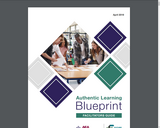
Tools and Ideas for educators who want to provide more authentic learning opportunities to kids.
- Subject:
- Business and Communication
- Career and Technical Education
- Material Type:
- Reading
- Author:
- Stephanie Lane
- Laura Williams
- Date Added:
- 09/11/2019

Tools and Ideas for educators who want to provide more authentic learning opportunities to kids.

PDF version of the slide deck of the Oregon Career Connected Learning Framework presentation from the Oregon CTE-STEM Summer Network Meeting on August 4, 2021. For additional help and/or questions please contact Jim Taylor at jim.taylor@state.or.us
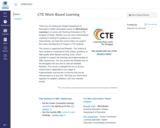
Visit the Oregon Department of Education's self-guided course on Work-Based Learning in a Career and Technical Education (CTE) Program of Study. Whether you are new to Work-Based Learning or looking for guidance on continuous improvement, we hope this course helps you support the career development of Oregon’s CTE students.
The course is organized into Modules. The content of each module is comprised of short videos, guidance on high-quality Work-Based Learning, tools, and/or activities to support the planning and implementation of WBL experiences. The course is designed for you to access content that is applicable to your stage of implementation and provide a resource that can be referred back to at any time.
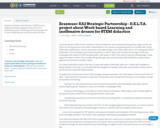
Intellectual Outputs from Erasmus+ DELTA project, offering teaching programmes about the use of inoffensive drones and Wrok based learning approach to boost STEM didactics in VET secodary education

Internships are an important mechanism for providing students an opportunity to explore a career and apply the skills and knowledge from school into a business setting. Canby High School was awarded a CTE Revitalization grant in 2011 to help them expand their internship program. Below are the resources and forms that Canby developed to guide the implementation of this project.

The Oregon Career Connected Learning Framework graphic provides a visual representation of Oregon's definition of CCL and potential activities that learners can participate in during their career education and development. Under the umbrella of Career Connected Learning, there are 4 domains: Awareness, Exploration, Preparation and Training. Within the 2 domains of Preparation and Training, lies the opportunity for Work-based learning.Users may incorporate this graphic into their work when communicating and providing professional development with regards to the CCL Framework and its four domains.
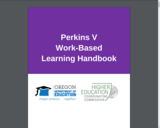
What is the purpose of this handbook?
The purpose of this handbook is to provide a shared resource for schools, districts, business,
industry, and community partners in support of a statewide effort to build a robust work-based
learning ecosystem in Oregon. The ultimate goals of supporting implementation of high quality
work-based learning are to ensure equitable learning outcomes for students, to connect
classroom learning with the world of work, and to strengthen community and school
partnerships.
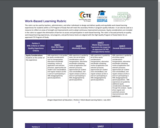
The rubric can be used by teachers, administrators, and other individuals to design and deliver quality and equitable work-based learning experiences for students within a CTE Program of Study that will meet the secondary Perkins V program quality indicator. It can also be used as a resource to reflect on areas of strength and improvements and to adopt continuous improvement processes. Equity considerations are included
in the rubric to support the elimination of barriers to access and participation in work-based learning. The rubric is focused primarily on quality work-based learning experiences, not programs, and performance levels are aligned with the High Quality Program of Study Rubric for an approved CTE Program of Study.
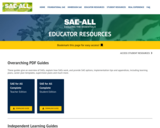
These guides give an overview of Supervised Agricultural Experiences (SAEs), explain how SAEs work, and provide SAE options, implementation tips and appendices, including leaning plans, career plan templates, supervision plans and more.
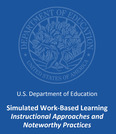
Work-based learning (WBL) has long been used in career and technical education (CTE) to allow students to practice the knowledge and skills they acquire in the classroom within a “real-world” business or industry setting. High-quality work placements reinforce school-based instruction by providing students with a context for applying academic theory with technical skills, and an authentic backdrop for learning the career-readiness (also described as employability) skills valued by employers. Simulated WBL aims to replicate workplace experiences by allowing students to immerse themselves in a realistic worksite activity without leaving campus (Lateef 2010). Simulations may be adopted for various reasons, including but not limited to the difficulty educators face in placing students with employers; logistical issues, such as the geographical isolation of rural providers or scheduling challenges that limit students’ ability to travel; safety or insurance issues that restrict students’ access or engagement; and labor laws, which may prohibit underage students from working.
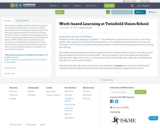
This website is a digital handbook written for people at Twinfield Union School who, at one time or another, place students in work-based learning experiences. The website provides information and resources with the intention to lead to consistency when placing students in work-based learning experiences and assessing their learning.
NOTE: Almost all of the information and resources in this handbook are verbatim from either from the Work-based Learning Coordinator graduate class, the Vermont Work-based Learning Manual or government documents.